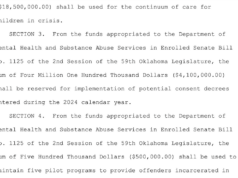
The brain is an organ that can be negatively affected by circumstances. The pile-on of a deadly virus and all the losses it has brought is severe and unprecedented in our lifetimes. The loss of loved ones, jobs, income, activities, events, routines and plans can be enough to make even the most cheerful and optimistic people spiral into deep depression, anxiety or addiction. Taking good care of your brain is every bit as important as taking care of your heart, lungs or kidneys.
If you have been struggling lately, you are not alone. A recent report from Oklahoma’s Healthy Minds Policy Initiative confirms that anxiety and depression have increased dramatically since the onset of the pandemic.
There is no shame in seeking help when you need it. One way to do this is to find a therapist — something you may have never needed until now. And that’s OK.
It’s nice to talk with good friends about how you are feeling, but when the things that bother you begin to disrupt your day-to-day life, you would benefit from seeing a professional therapist.
Therapists are trained to assist you without passing judgement and with full confidentiality. They will provide counseling and can also connect you to a psychiatrist for medication evaluation if needed.
Knowing how to find a therapist in Oklahoma — and starting therapy in general — can seem hard if you’ve never done it before. But starting your mental health journey is also an exciting step, and the information below outlines some first steps to getting started.
Determine how you will pay
Unfortunately, therapy can be expensive, and prices vary from therapist to therapist. But there are ways to keep the costs under control, and various programs try to make mental health care more available to people of all income levels.
Many health insurance plans offer some coverage for mental health care. Consult your plan to find out what is covered and to obtain a list of providers who take your insurance.
A number of therapists don’t accept insurance, but some provide a sliding payment scale to adjust the cost according to your income. If you end up paying out of pocket, you might want to seek out a therapist that offers this accommodation.
If you don’t have insurance, find out if you qualify for Medicaid (called SoonerCare in Oklahoma). If you do, get signed up on the Oklahoma Health Care Authority’s website. Medicaid provides coverage for mental health or addiction services.
Even If you don’t qualify for Medicaid, you can still contact any Community Mental Health Center or Certified Community Behavioral Health Clinic in your area. They offer a full range of services to people without insurance using funds from the Oklahoma Department of Mental Health and Substance Abuse Services. You can search for available services through the ODMHSAS website or by contacting any center directly.
Where and how to find a therapist in Oklahoma
Word-of-mouth referrals for mental health professionals are often the most reliable, so ask health care providers, family and friends for recommendations if you can.
A popular online resource is the website of Psychology Today, which allows you to search for therapists by location, specialization, price, insurance and more. You can also Google therapists whose profiles interest you to find online reviews.
The Alliance of Mental Health Providers of Oklahoma, of which I am a member, is the largest network of mental health providers in the state. We accept private insurance, Medicare and Medicaid, and we work with individuals who do not have the ability to pay. You can search for providers on our website.
What to look for
Start by educating yourself. There are many innovations happening in mental health treatment, and therapists use a host of different approaches and specialize in treating different problems.
Some of the types of therapy you might come across in your search include cognitive behavioral therapy, family and marital therapy, the trust-based relational intervention model, solution focused brief therapy, eye-movement desensitization and reprocessing, and many more.
It can be worth doing some research to familiarize yourself with different approaches and which ones sound like they might be a good fit for you.
But don’t worry if you can’t do a deep dive on the entire field of psychology. Simply focus on finding a therapist that meets your needs.
During your first session, pay attention to whether you feel comfortable in the therapist’s office and safe sharing information with them. If you don’t feel a therapist is a good match for you, it is perfectly fine to find someone you are more comfortable with. Just remember, you are not finding a friend, you are finding a professional to assist you through a difficult time.
It is important that you make your needs known to your therapist. It’s OK to interview them and ask if they have previously worked with whatever your need may be. It’s important that you be able to trust the therapist, and a good therapist will also work hard to gain your trust.
As you consider how to find a therapist in Oklahoma, it can be helpful to understand the different types of mental health care providers. These include:
- Psychiatrists: Psychiatrists are medical doctors who specialize in mental health and addiction. They are qualified to assess both the mental and physical aspects of psychological problems. They are also licensed to prescribe medications. Other therapists often work with psychiatrists if a medical evaluation is needed.
- Psychologists: Psychologists have PhD or PsyD degrees. They have professional training and clinical skills to help people learn to cope more effectively with life issues and mental health problems, but they are not licensed to prescribe medication.
- Licensed Professional Counselors and Licensed Clinical Social Workers: These credentials require master’s degrees. LPCs and LCSWs are both licensed professionals trained to provide counseling, assessment, and referral services related to mental, emotional, and behavioral disorders.
There are a few other credentials you’ll come across as well, and sorting through them all can make you dizzy. There are excellent practitioners — and not-so-good ones — at all levels of credentialing.
Lastly, remember that telehealth is a perfectly legitimate way to access care. In fact, according to the Healthy Minds report, telehealth has become the top method for accessing mental health services for people with insurance. Around half of telehealth encounters in Oklahoma are related to mental health needs, and most providers now offer telehealth services.
In a crisis?
Sometimes a person needs immediate mental-health support and doesn’t have the time or capacity to research options and resources.
If you are considering suicide, please call 1-800-273-8255. You can also use the Lifeline Chat. Or if you are in a crisis and unsure about who to contact, call Heartline at 211. They are experts in directing people to free resources across the state.
Related





















